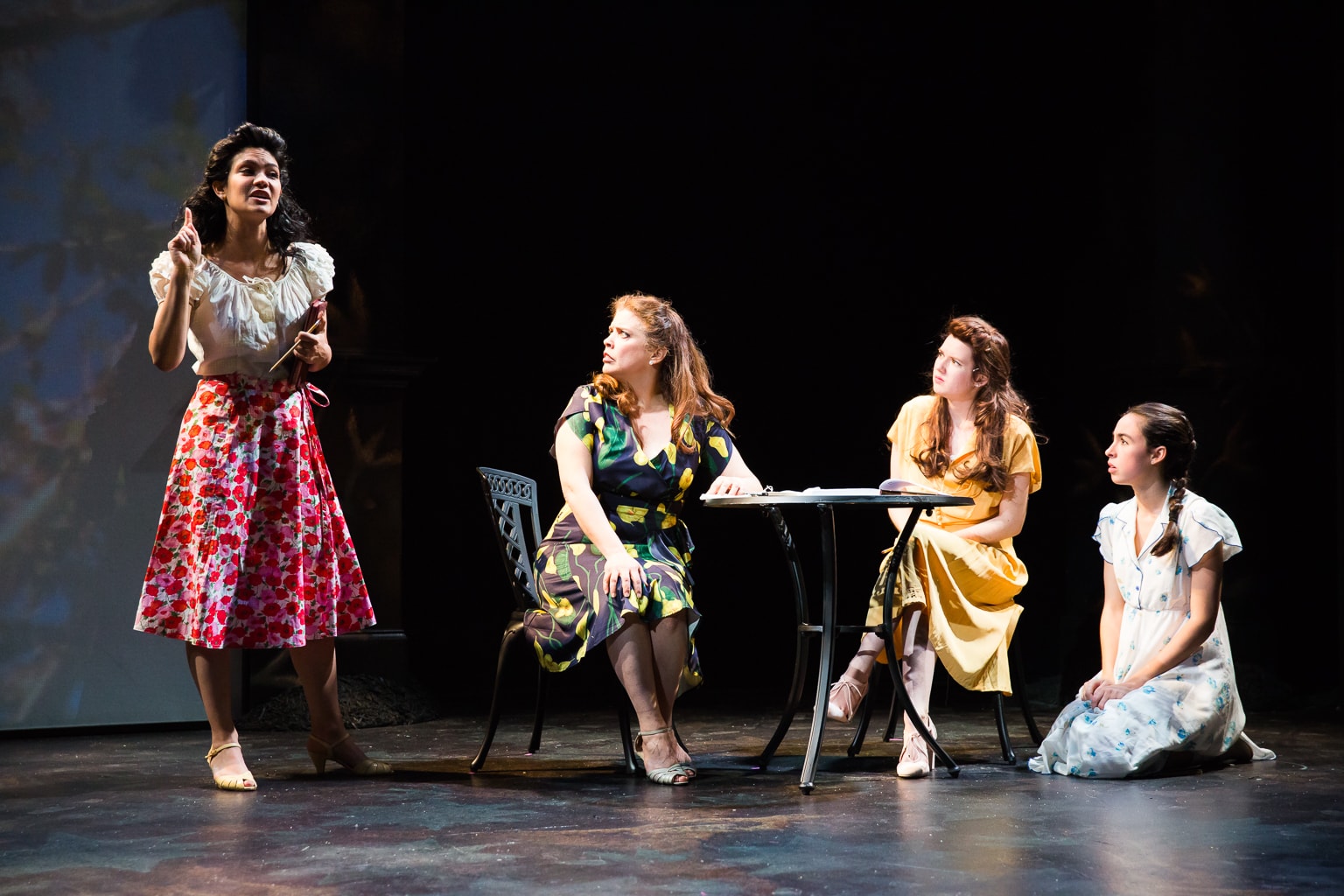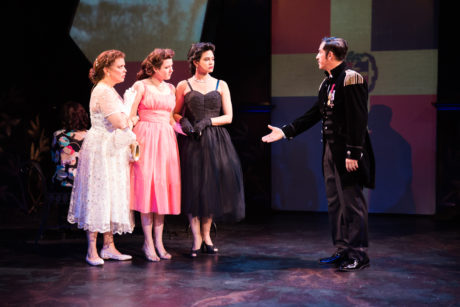The play En el tiempo de las mariposas (In the Time of the Butterflies), making its D.C. debut at GALA Hispanic Theatre, tells one of the most inspiring and heart-wrenching stories to come out of the Americas: the true tale of the Mirabal sisters, freedom fighters from the Dominican Republic. However, while the play (adapted from Julia Álvarez’s historical novel of the same name) is admirably acted and features some excellent lighting and costumes, Caridad Svich’s adaptation feels disjointed and doesn’t sketch out the sisters’ lives with enough detail. Still, the result is a passionate, moving show that teaches an important lesson: women are more than capable of carrying entire revolutions on their backs.

First, a bit of history: in the 1950s, Dominican sisters Patria, Minerva, and María Teresa Mirabal joined the resistance against Rafael Leonidas Trujillo, one of the most brutal dictators to ever take power in Latin America. Minerva, the most outspoken sister, had rejected Trujillo’s advances at a party, so he prevented her from achieving her dream: practicing as a lawyer. The three sisters, who took the code name ‘las Mariposas’ (the Butterflies), balanced plotting Trujillo’s assassination with keeping house and raising children. Their fourth sister, Dedé, didn’t join because her husband wanted her to stay out of politics.
In 1960, Trujillo had Patria, Minerva, María Teresa, and their chauffeur, Rufino, killed. Patria was 36, Minerva was 34, and María Teresa (Mate) was 24. Dedé, the only sister who survived, was left to tell their story.
En el tiempo de las mariposas is narrated by Dedé, now an old woman, who has lived the rest of her life burdened with guilt and grief. The play switches between Dedé’s recollections of the past, when the Mirabals were young women, and the present, in which she speaks with a Dominican-American woman who’s come to write a book about the Mirabals.
Broselianda Hernandez anchors the show as Older Dedé. Her expressions are subtle, but convey decades of regret, and she commands the stage every time she appears. Older Dedé has the most lyrical lines of the show, and Hernandez handles the words with an appropriate gravity. It brought tears to my eyes when Dedé said that memories are like scraps of paper in the wind, the ink vanishing into the air.
Director José Zayas has coached convincing performances out of the four sisters. Alina Robert as the fiery Minerva and Inés Dominguez del Corral as the impulsive Mate are particularly good. Oldest sister Patria is a devout Christian, and Lorena Sabogal brings Patria’s faith and respect for humanity to life. Catherine Nunez as Young Dedé wobbles back and forth between wanting to rebel and fearing for her and her husband’s lives.
Delbis Cardona, as all the show’s male characters, is the play’s best-kept secret. He switches easily between a present-day DJ, a radio announcer in the 1950s, Trujillo, a revolutionary named Virgilio, and chauffeur Rufino. Cardona’s voice and mannerisms change so completely between characters that there’s never any danger of confusing who he’s supposed to be. His oily, aggressive Trujillo is a standout, and a dance scene between Trujillo and Minerva (Robert) is the best in the play.

It’s a shame, then, that the play itself doesn’t give this talented cast a script of equal power. Svich’s adaptation never establishes why Trujillo is a dictator who deserved to die. This is odd, since historical evidence abounds (he massacred Haitians, raped underage women, and literally fed his enemies to the sharks). The Mirabal sisters’ decision to join the resistance seems hollow as a result.
In addition, the sisters are never shown resisting. They are shown in the kitchen, in the garden, and in prison, but rarely do they mention any of the work they’re doing to bring Trujillo down. Crucial bits of information that show the sisters’ involvement – they plotted a failed assassination attempt, married fellow revolutionaries, and distributed illegal pamphlets – pass as mere blips of dialogue. Other scenes, like a game of dice that Minerva plays with Trujillo and the moment of the sisters’ death, are narrated rather than shown. This is a strange choice that defuses tension rather than escalating it.
The play constantly flips back and forth between the past and present. This would be fine if the present didn’t have a subplot, but the conversations between Older Dedé and the Young Woman feel like a distraction. Older Dedé could have carried those scenes on her own. When she and the Young Woman argue about how to best represent the past, the play gets dragged down with heavy-handed, cliched language.
Alex Basco Koch’s projections, which make up most of the play’s set are also distracting. They work when they show settings, like the Mirabal’s house in Salcedo. However, when the projections are of specific objects, they take away from the actors’ fine work. When Mate describes her aunt’s secret recipe for chocolate pastries, the audience doesn’t need to see the ingredients getting mixed in a projected bowl.
The lighting is evocative, though, and without it the shifts between the 1950s and modern day would have been much more jarring. Christopher Annas-Lee’s light design shifts easily from the warm, safe garden at the Mirabals’ house, to the glare of a prison, to the disco lights of a bachata club. Moyenda Kulemeka’s costumes are subtle, but fitting, and help establish each sister’s personality.
En el tiempo de las mariposas is a bilingual play; the actors speak in Spanish, and screens display the English translations. Putting on a bilingual show is always a challenge, but Caridad Svich’s subtitles aren’t too wordy, and two screens (one on house right, one on house left) mean that everyone can see the words in English. Non-Spanish speakers won’t have trouble understanding the show.
As a near-worshipper of the Mirabal sisters – I’ve visited their house in Salcedo, as well as the site in Puerto Plata where they were murdered – I came away from En el tiempo de las mariposas dissatisfied. The show doesn’t do enough with the rich historical and literary material from which it draws. However, as a theater fan, I appreciated the fine work of the cast and crew.
“Si me matan, yo sacaré mis brazos de la tumba y seré más fuerte,” wrote Minerva Mirabal. “If they kill me, I will reach my arms from the tomb and I will be even stronger.” She was right. She and her sisters live on in stories, and En el tiempo de las mariposas is a flawed, but earnest homage to four sisters who deserve to be remembered forever.
Running Time: Two hours, with no intermission.
En el tiempo de las mariposas plays through May 13, 2018, at the GALA Hispanic Theatre – 3333 14th Street, NW, in Washington, D.C. For tickets, purchase them online.




